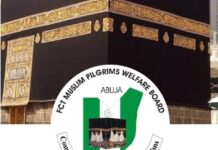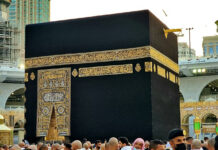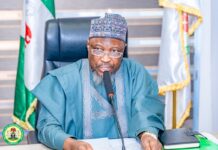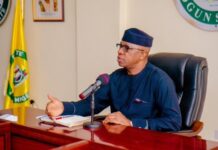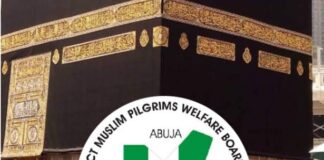By Fatima Sanda Usara
The National Hajj Commission of Nigeria moved into its permanent headquarters at the twilight of the Barrister Abdullahi Mukhtar led 3rdNAHCON board. This followed series of bureaucratic hiccups, from which the commission emerged successfully.
Unceremoniously then, Barrister Mukhtar moved into the edifice to avoid expending another capital vote on rent despite the necessary renovation still impending. The gradual movement from NAHCON’s former office in Sokoto House started on the 9thof October 2019 with the Procurement Unit leading the way.
The Chairman’s office followed up on the 16thof same month. Reason for this gradual movement was to make the place habitable in phases. The first management meeting was held on 17thOctober while the first ever board meeting took pace on 22ndof October 2020. With the board meeting, NAHCON formally relocated to its new office while reconstruction was on going.
Formerly Metro Plaza, the Hajj House was purchased in 2017 at the cost of N2B, 400M. Of this amount, only N587M came from government allocation in form of capital project funding. The rest was from NAHCON’s internal savings. The property consists of the four-storey main building housing the Commission’s headquarters, two annexes, B and C, a spacious parking space that can hold up to 600 cars, two 500-KVA generators and a motorized borehole and water treatment plant. Owning the property was celebrated as a gigantic leap at the time of its purchase. The vision was to transform the Hajj House into a Hajj headquarter that will compete with any other globally.
Read Also:Saudi Arabia reopens 44 mosques after sterilisation
It is now one year since the Zikrullah led 4thboard took over management of Hajj House from its predecessor. What is the house’s current outlook? . How far has the new board gone in giving the former Metro Plaza a befitting face-lift?
As it stands, the Hajj House is not just an office accommodation; it is turning into an enterprise with lucrative prospects. Recall that goal of NAHCON is financial autonomy that will reduce burden of governance on federal administration. Hence, the transformations in the Hajj House are tailored to fit into this plan. Thus, it is already common knowledge that apart from bailing out NAHCON from paying an annual rent in the tune of about 20 million Naira, the other two annexes fetch the Commission nothing less than N70 million yearly in revenue.
Today, one conspicuous and awesome creation completed by the Zikrullah Kunle Hassan led administration is the NAHCON Conference Hall. Sitting outdoor is a fully revamped international standard conference Hall with about 360-person sitting capacity. It is embellished with glittering walls, central air conditioners, a CCTV camera, modern screen projector and latest gadgets to facilitate smooth conferencing. The Conference Hall is repositioned for in-house use and revenue generation through leasing. The Hall saves the Commission scarce resources gulped by hall hire for its official events.
Another world-class facility poised to add to the NAHCON purse is the ICT Centre. Currently equipped with about 20 modern computers of the Lenovo V530MT model; a 10 KVA inverter accompanied by 300-watts monocrystalline solar panels for uninterrupted power supply, the centre is the kind that can be rented for any computer based testing/examination such as those conducted by JAMB (Joint Admissions and Matriculations Board), IELTS (International English Language Testing System) TOEFL (Test of English as a Foreign Language), any of ICT training programs and even film shootings if the Commission finds it suitable. Also installed is Another 7.5 KVA generator on standby to complement the solar inverter. In addition is a long-range wireless antenna suitably fixed for ceaseless Internet connectivity.
The changing face of Hajj House’s inner chamber is a site to behold from its former state. The Board Room is the first to feel the hammer of reconstruction due to its significance. Then the Chairman’s office, which was initially partially touched to allow managerial work to progress. The general staff rooms were also temporarily restructured but fully air-conditioned with convenient workstations provided to facilitate conducive working conditions for employees before the final picture materialises. The real partitioning is around the corner as we write. Within this short period, elevators have also been revamped for ease of movement.
Of immense pleasure to staff and guests alike are the totally overhauled former restrooms into over 80 world-class toilet cubicles for convenience. The wash hand basins, ablution areas, soap dispensers and above all incessant water supply are all amenities that give one a lavatory delight. The Conference Hall alone holds ten standard toilet compartments plus five urinary areas.
Renovation of the three offices of the Commissioners is another done deal and an impressive transformation. Each of the offices is a mini complex of its own comprising a spacious main office, a meeting room, a guest waiting room, office of Special Assistant, and the secretaries’ office. The Pent House housing Office of the Chairman and CEO is now undergoing uplift from its temporary state.
The Zikrullah led management is presently laying foundation for an ambitious mosque project that would accommodate about 500 worshippers at a time. Expected time of project delivery is by March 2021. Likewise other construction/renovation jobs as envisaged in the master plan will continue taking shape until the ultimate projection of the Hajj House founding fathers is accomplished and more innovations added.
This is not a tall dream, considering that NAHCON is the organization in reference. Indeed, recall that during the 2019 budget defence, Sen. Adamu Bulkachuwa, Chairman Senate Committee on Foreign Affairs, commenting on Hajj House, expressed joy that a government agency is having a tenable vision for self-sustenance. At the time, he commended the Commission for running its foreign and local operations 100% from its purse without funding from government for the first time since 1975. The Distinguished Senator threw this achievement as a challenge to other government parastatals. Certainly, the 4thNAHCON Board is living up to its name, keeping up with the tradition despite Covid-19 setbacks.
Usara is Head, Public Affairs NAHCON

